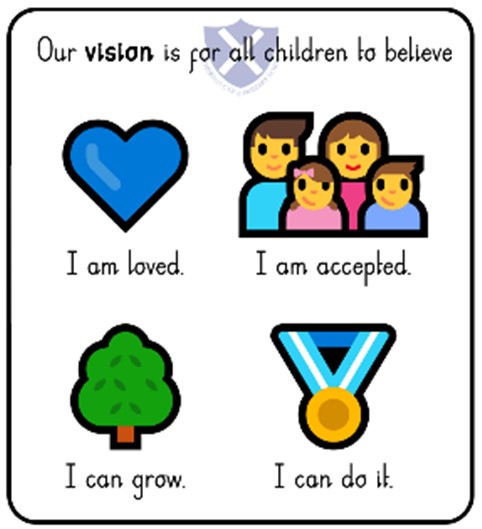English - Writing
Intent
At Netherton CE Primary School, we intend for all children to develop as confident, accurate and expressive writers, who are able to reflect upon their work and consider the audience and purpose.
We aim to use a diverse range of high-quality texts to ensure that our children have high aspirations when writing, allowing them to write meaningfully and in a variety of different styles. We seek to build strong foundations within the technical aspects of spelling, grammar and handwriting so that writing becomes automatic, and children develop their own flow and style of writing; enabling them to use their imaginations and showcase their creativity.
Our Read Write Inc. systematic, synthetic phonics programme develops the skills of decoding, segmenting and spelling in the early years and KS1 in order to build strong foundations for writing in KS2.
We endeavour for all our children to develop a comfortable, legible and consistent handwriting style and to have pride when writing.
Above all, we have a fundamental desire for our children to be exposed to rich vocabulary of language that enriches their understanding and gives them the lifelong skills they need to be able to grow academically and spiritually. O
ur goal is for our children to be clear, accurate and coherent writers who can adapt their language and style for a range of contexts, purposes and audiences now and in the future.
Implementation
We teach the National Curriculum expectations with skills and knowledge progression built from a clear, long-term progression plan incorporated in a detailed sequence of learning. This ensures that skills and knowledge are built on year by year and sequenced to maximise learning for all children, regardless of background or ability. Planned progressive sequences of learning are linked to quality, age-related texts that include a wide variety of diversity and genres. Children are exposed to new vocabulary which they can apply in their writing. Children are provided with opportunities to write for a range of different purposes and audiences as well as orally rehearse what they are going to write through a range of spoken language outcomes. We teach children to plan, edit and improve their work at an appropriate level for their age and ability. A variety of feedback strategies helps to support the children in understanding the areas for next step development. Grammar and spelling are threaded through the sequences of learning and also supplemented through starters and quality shared writing. Shared writing is an integral aspect of our writing lessons, where high expectations are set, in order for all children to be challenged and highly motivated. It also provides an opportunity to incorporate high levels of vocabulary and to value and respect children’s ideas. We provide children with the freedom of expression through an extended writing lesson, where children can apply the skills that they have been taught and have fun with their writing along the way.
Pupils begin with a high-quality model text, explore the features of the specific genre they are covering and learn the related context and vocabulary with the opportunity to practice and apply their learning on a regular basis.
The explicit teaching of our ‘Kinetic Letters’ handwriting programme is explored weekly and children are able to apply these skills directly in their day-to-day writing.
Our spelling progression map is used to explore spelling patterns through a series of games, tasks and exercises that enable the pupils to remember and apply these spelling rules in their own writing at age related expectations.
In the Early years and KS1, we expect children to apply the phonic strategies learned within the Read Write Inc. programme that we so robustly teach. In foundation stage particularly, we use ‘drawing club’ to bring a text to life, teach high order vocabulary and give creativity and meaning to the very early stages of writing and writing application.
Punctuation and grammar are also explicitly taught and built into the sequence of learning that they are currently exploring.
We have built in a greater focus on editing and improving pupils’ writing through a series of feedback strategies, which enable pupils to publish their writing and feel proud.
Pupils are praised and rewarded regularly for their perseverance, personal growth and progression from their own individual starting points and an impactful intervention programme supports pupils at risk of falling behind.
Impact
By the time children leave Netherton CE Primary School, regardless of their background, ability or additional needs, they will have built on the strong foundations of a progressive and well sequenced writing curriculum. They will use a wide vocabulary and have a solid understanding of both spelling patterns and grammar rules. They will write clearly, accurately and coherently, adapting their language and style for a range of contexts, purposes and audiences. Children will take pride in the presentation of their writing, demonstrating a good, joined, handwriting style. As good writers, they will have learned to refine and edit their writing and write using high levels of vocabulary, feeling positive and proud when their writing has been completed or published.
Children will be assessed via national statutory assessments in Reception and Year 6 and teacher assessed in other years via a range of summative and formative assessments involving extended writing pieces, spelling tests, handwriting application, and ongoing assessment for learning against the national age-related expectations. Children at risk of falling behind, will have a variety of 1:1 tutoring, group intervention, precision teaching or individual daily targets to work on in order for them to keep up with the standards of writing in their year group.
Above all, children will be confident and creative writers who have the skills and knowledge to be able to utilise their writing proficiencies in the wider world.
Characteristics of a Writer
- Creativity
- Strong vocabulary
- Passion for reading
- Attention to detail
- Communication skills
- Perseverance
- Expressive
- Empathy
- Adaptability
- Discipline
- Open to feedback and criticism
- Patience
Potential Careers
- Author
- Journalist
- English teacher
- Marketing manager
- Web content creator
- Editor
- Lawyer
- Historian
- Publisher
- Professor
- Psychologist.
Road Map

